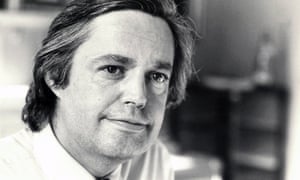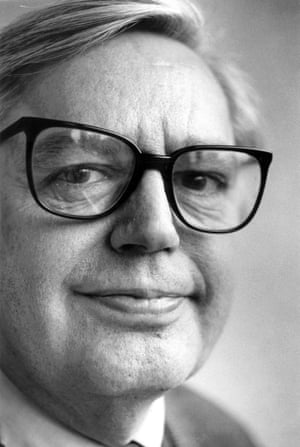
Alexander Chancellor, who has died aged 77, was a journalist of grace and distinction whose work as a writer and editor enhanced several British magazines, including the Oldie, which he was editing when he took ill last week. Perhaps his greatest success came with his reinvention in the mid-1970s of the Spectator, a fading weekly to which he gave a lively shape and tone that has survived the half-dozen editors who succeeded him.
There and elsewhere, including the Guardian, he wrote numerous columns and diaries that were delightfully expressed and read effortlessly, though their composition was often hard-won and tight against the deadline. Tina Brown, when she was hiring him to write the Talk of the Town column at the New Yorker, said he had “perfect pitch” as a writer, which was true, though his time at her magazine turned out to be a rare failure and Chancellor would laugh – an inimitable sound, keexxsh, keexxsh, like some big bird calling from the reeds – whenever the perfect-pitch remark came up.
Self-deprecation was Chancellor’s default mode; as he left the Oldie office for what turned out to be the last time, he apologised to his colleagues for being ill – or “so boring” as he put it. He wore his background lightly. The Chancellors were a grand Scottish family who could claim connection with an estate, Shieldhill, near Biggar in Lanarkshire, that went back several centuries. (Today the house is a country hotel featuring a “Chancellor” honeymoon suite that, as Alexander never ceased marvelling, had been slept in by Nelson Mandela.)
Alexander’s grandfather, Sir John Chancellor, rebased the family in the south when he left Scotland for a career in the army and the colonial service, where he rose to become governor of Southern Rhodesia and, in 1928, the high commissioner for the British mandate of Palestine and Transjordan. A family friend gave his eldest son, Christopher (later Sir Christopher), a job with the Reuters news agency, where his energy and cool-headedness quickly marked him out for promotion, first as general manager of the agency’s east Asia operations in Shanghai and eventually as chairman of Reuters worldwide. He married Sylvia, the daughter of the physicist and barrister Sir Richard Paget, in 1926. Alexander, the youngest of their four children, was born in the family’s country house at Dane End in Hertfordshire and then moved to the family’s London flat near St Paul’s, where he somehow survived the blitz.

He went to Eton, as his father had done, and read languages at Trinity Hall, Cambridge, where he scraped a degree. Undoubtedly, his birth and upbringing gave him a web of helpful connections, and not just of the old English kind – thanks to his father’s newspaper friendships, a young Oxford student called Rupert Murdoch was sometimes a house guest. But for a time Alexander thought he might strike out and find a career in music – he was Eton’s star pianist – until his father was advised that, though his son was good player, he would never make the top rank.
He worked for a time for a part-work encyclopedia, Knowledge, edited by his elder brother, John, until parental influence found him a job at Reuters. In 1964 and newly married to Susanna Debenham (they were distant relations – his mother’s sister had married her father’s uncle), he moved to Paris as a trainee reporter and then, after a spell back at the London office, became bureau chief for Reuters in Rome, where a love of Italy began that lasted all his life.
In 1974 he left Reuters for an unhappy spell at ITN, mercifully cut short in 1975 by a proposal from the Spectator’s new owner, Henry Keswick, that he edit the magazine. Keswick was a taipan, a leading member of the Jardine Matheson dynasty, which made its fortune in east Asia, and a friend since childhood. Chancellor used to say that Keswick offered him the job because he was the only journalist Keswick knew. Whatever the case, it proved to be an inspired appointment. Chancellor had no track record whatsoever as an editor, but he was endlessly curious, quietly mischievous, and a good judge of copy: nepotism, it turned out, had delivered the goods.
During his nine-year editorship, the Spectator was transformed from a bilious and parochial Tory weekly into an entertaining magazine, maverick in its sympathies, that people across the political spectrum (or outside it altogether) could read with pleasure. Chancellor installed Auberon Waugh as the magazine’s social commentator, Ferdinand Mount as its political writer and Richard Ingrams as the television critic; and commissioned the troubled Jeffrey Bernard and the smug “Taki” Theodoracopulos to write autobiographical columns under the rubrics Low Life and High Life that contrasted bad and good fortune.
The Spectator style was informal, personal and direct. Occasionally the tone became tiresome when attention-seeking writers taunted liberal opinion with their “no nonsense” views on race and class, but overall Chancellor managed the magazine as a broad church. He gave opportunities to writers of many different backgrounds and beliefs and invited all kinds of people to the weekly office lunches, where Jennifer Paterson, later to be one of the Two Fat Ladies, did the cooking and alarmed the guests.
The circulation doubled, but only to about 20,000. Keswick sold the magazine to the entrepreneur Algy Cluff in 1981 and Chancellor did not last long under his ownership. Many jobs followed. He went to Time and Tide as editor, to the Sunday Telegraph as Peregrine Worsthorne’s deputy editor, and to Washington for two years from 1986 as US editor of the newly founded Independent. In 1988, he launched the Independent’s Saturday magazine and over the next four years established it as the most distinctive of Britain’s newspaper supplements, with a devotion to black and white photography and an unflashy presentation that earned many admirers.
His short spell at the New Yorker followed, after which he returned to the Telegraph to set up its new Sunday magazine, which turned out to be __more elegant than its potential readers wanted or possibly deserved. In 1999, he published an engaging account of his transatlantic experiences, Some Times in America, and between 1996 and 2012 contributed a weekly column to the Guardian, having befriended its then editor, Alan Rusbridger, when both were based in Washington and played piano duets together.
He returned to editing in 2014 – a surprise last act – when James Pembroke, the Oldie’s publisher, hired him to replace Richard Ingrams, with whom, years before, Chancellor had “cooked up” the idea, to use his words, of a “truly independent, free-thinking, no-bullshit magazine” that would stand out in a media obsessed with youth and celebrity.
What made him a good editor? Partly a knack for finding good writers and recognising interesting ideas; partly his textual skill – contrary to the dilettante image, fostered by three-bottle lunches and 60 Rothmans a day, he could often be found late at night changing captions and rewriting headlines, but mainly he was good because he won loyalty from his staff and contributors. “He was a completely wonderful editor,” said his literary editor at the Spectator, Geoffrey Wheatcroft, “even if we couldn’t always understand why he was. We loved him.”
Chancellor lived latterly in a house in Northamptonshire given to him by his father’s younger brother, Robin, who stayed on in one of two Inigo Jones pavilions that had flanked the original, long-vanished villa. Later, Alexander’s brother John moved in to the stable block across the yard. It was a warm and welcoming household. Alexander was a fine and imperturbable cook who got on well with children and played songs from Broadway musicals on the piano. He had a memorable wit. “One of the good things about your stuff,” he told me, after reading another evocation of the West Fife coalfield in 1955, “is that there’s never any danger that you’ll come across the Mitfords.”
He is survived by Susanna and the two daughters of their marriage, Eliza and Cecilia; by a third daughter, Freya, whose mother is the journalist and children’s author Emily Bearn; and by four grandchildren. He is also survived by two sisters, Susanna and Teresa; his brother predeceased him.
• Alexander Surtees Chancellor, writer and editor, born 4 January 1940; died 28 January 2017